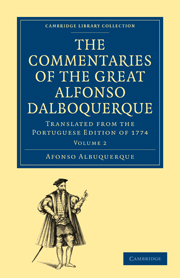 The Commentaries of the Great Afonso Dalboquerque, Second Viceroy of India
The Commentaries of the Great Afonso Dalboquerque, Second Viceroy of India Book contents
- Frontmatter
- Contents
- INTRODUCTION
- CHRONOLOGY OF PART II
- TITLE TO THE EDITION OF 1774–PART II
- TITLES OF THE CHAPTERS CONTAINED IN THE SECOND PART
- MAP OF INDIA
- PART II WHEREIN ARE CONTAINED THE DEALINGS OP THE GREAT AFONSO DALBOQUERQUE WITH THE VICEROY: AND WHAT HE DID AFTER BEING INVESTED WITH THE GOVERNMENT OF INDIA, UNTIL THE FIRST TAKING OF GOA
- CHAPTER I
- CHAPTER II
- CHAPTER III
- CHAPTER IV
- CHAPTER V
- CHAPTER VI
- CHAPTER VII
- CHAPTER VIII
- CHAPTER IX
- CHAPTER X
- CHAPTER XI
- CHAPTER XII
- CHAPTER XIII
- CHAPTER XIV
- CHAPTER XV
- CHAPTER XVI
- CHAPTER XVI
- CHAPTER XVIII
- CHAPTER XIX
- CHAPTER XX
- CHAPTER XXI
- CHAPTER XXII
- CHAPTEE XXIII
- CHAPTER XXIV
- CHAPTER XXV
- CHAPTER XXVI
- CHAPTER XXVII
- CHAPTER XXVII
- CHAPTER XXIX
- CHAPTER XXX
- CHAPTER XXXI
- CHAPTER XXXII
- CHAPTER XXXIII
- CHAPTER XXXIV
- CHAPTER XXXV
- CHAPTER XXXVI
- CHAPTER XXXVII
- CHAPTER XXXVIII
- CHAPTER XXXIX
- CHAPTER XL
- CHAPTER XLI
- CHAPTEE XLII
- CHAPTER XLIII
- CHAPTER XLIV
- CHAPTER XLV
- CHAPTER XLYI
- CHAPTER XLVII
- CHAPTER XLVIII
- CHAPTER XLIX
- CHAPTER L
- CHAPTER LI
- Plate section
CHAPTER XXV
Published online by Cambridge University Press: 05 July 2011
- Frontmatter
- Contents
- INTRODUCTION
- CHRONOLOGY OF PART II
- TITLE TO THE EDITION OF 1774–PART II
- TITLES OF THE CHAPTERS CONTAINED IN THE SECOND PART
- MAP OF INDIA
- PART II WHEREIN ARE CONTAINED THE DEALINGS OP THE GREAT AFONSO DALBOQUERQUE WITH THE VICEROY: AND WHAT HE DID AFTER BEING INVESTED WITH THE GOVERNMENT OF INDIA, UNTIL THE FIRST TAKING OF GOA
- CHAPTER I
- CHAPTER II
- CHAPTER III
- CHAPTER IV
- CHAPTER V
- CHAPTER VI
- CHAPTER VII
- CHAPTER VIII
- CHAPTER IX
- CHAPTER X
- CHAPTER XI
- CHAPTER XII
- CHAPTER XIII
- CHAPTER XIV
- CHAPTER XV
- CHAPTER XVI
- CHAPTER XVI
- CHAPTER XVIII
- CHAPTER XIX
- CHAPTER XX
- CHAPTER XXI
- CHAPTER XXII
- CHAPTEE XXIII
- CHAPTER XXIV
- CHAPTER XXV
- CHAPTER XXVI
- CHAPTER XXVII
- CHAPTER XXVII
- CHAPTER XXIX
- CHAPTER XXX
- CHAPTER XXXI
- CHAPTER XXXII
- CHAPTER XXXIII
- CHAPTER XXXIV
- CHAPTER XXXV
- CHAPTER XXXVI
- CHAPTER XXXVII
- CHAPTER XXXVIII
- CHAPTER XXXIX
- CHAPTER XL
- CHAPTER XLI
- CHAPTEE XLII
- CHAPTER XLIII
- CHAPTER XLIV
- CHAPTER XLV
- CHAPTER XLYI
- CHAPTER XLVII
- CHAPTER XLVIII
- CHAPTER XLIX
- CHAPTER L
- CHAPTER LI
- Plate section
Summary
Of the agreement which the great Afonso Dalboquerque entered into with Timoja and the principal men of the country, concerning the dues they would be required to pay each year, and how at their request he ordered coin to be struck.
After that Francisco Pantoja had sailed away, Timoja proceeded to the great Afonso Dalboquerque with the principal men and nobles of the land, as well Moors as Hindoos; and they told him that, in order that the course of things in Goa should remain in the same order and ancient custom in which they had always been hitherto, it would be necessary that all should understand the method which they were to practise in regard to the payment of dues. For, they alleged, the Çabaio, after he had become Lord of the kingdom of Goa, had doubled the amount of taxes, at which proceeding every one had been annoyed, and on this account many Hindoos had gone away to settle in divers parts; for anciently they used to pay a hundred and fifty thousand xerafins; but afterwards the Çabaio had doubled this tax; and that they were afraid lest his Lordship, following this practice which he had found them labouring under, should oblige them still to pay this increased taxation; and that they begged him of his kindness to endeavour to arrange this matter in such a manner that the people might be able to get their living, and yet pay something: for it was but reasonable to expect, now they had become the servants of so great a king as the King of Portugal was, that they should enjoy more liberty, in some respects, than they had hitherto possessed, when they lived under the rule of the Çabaio, a tyrant who had been ill-disposed towards them.
- Type
- Chapter
- Information
- The Commentaries of the Great Afonso Dalboquerque, Second Viceroy of IndiaTranslated from the Portuguese Edition of 1774, pp. 124 - 131Publisher: Cambridge University PressPrint publication year: 2010First published in: 1877


